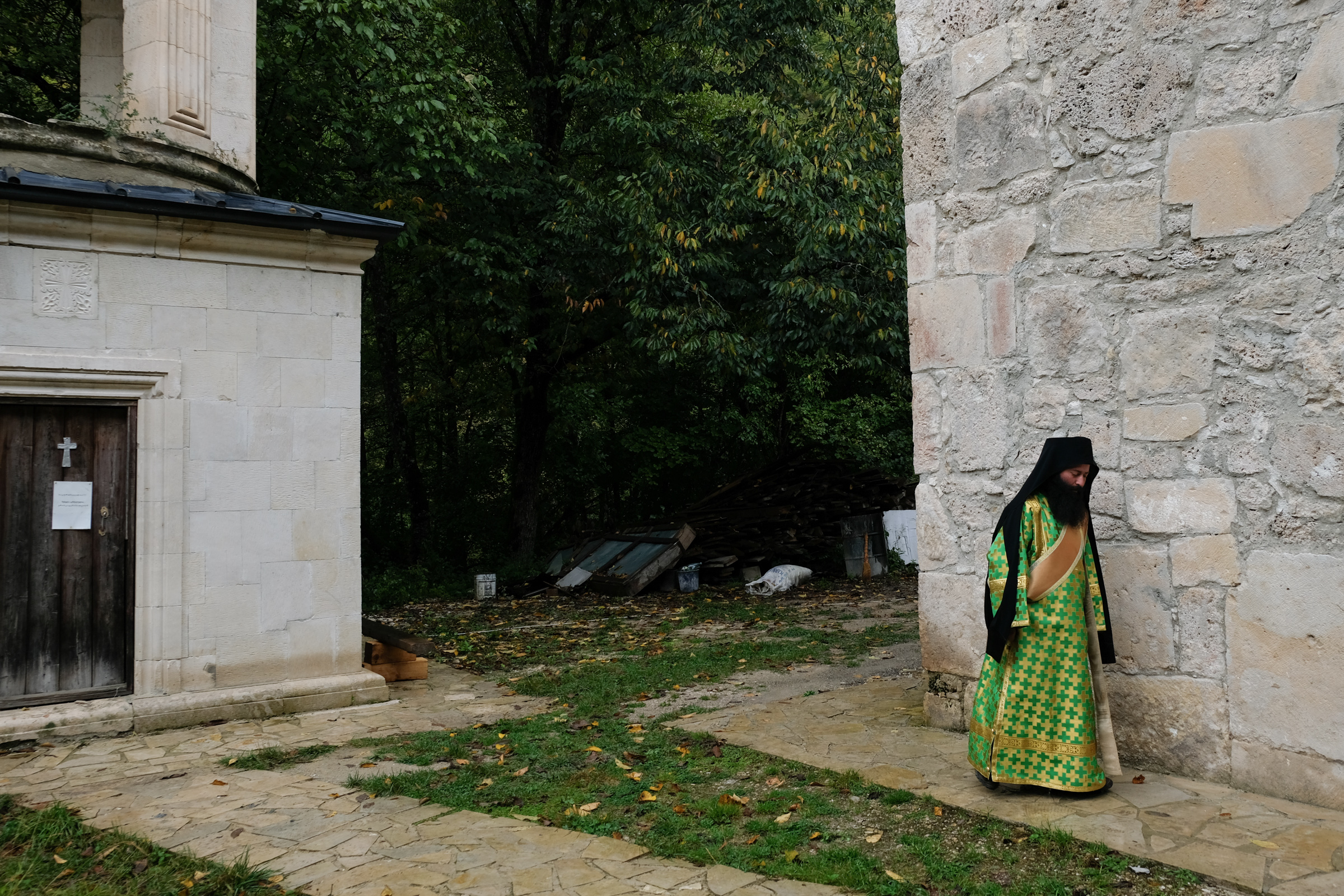Holy wine
The blessed drink of a Georgian village
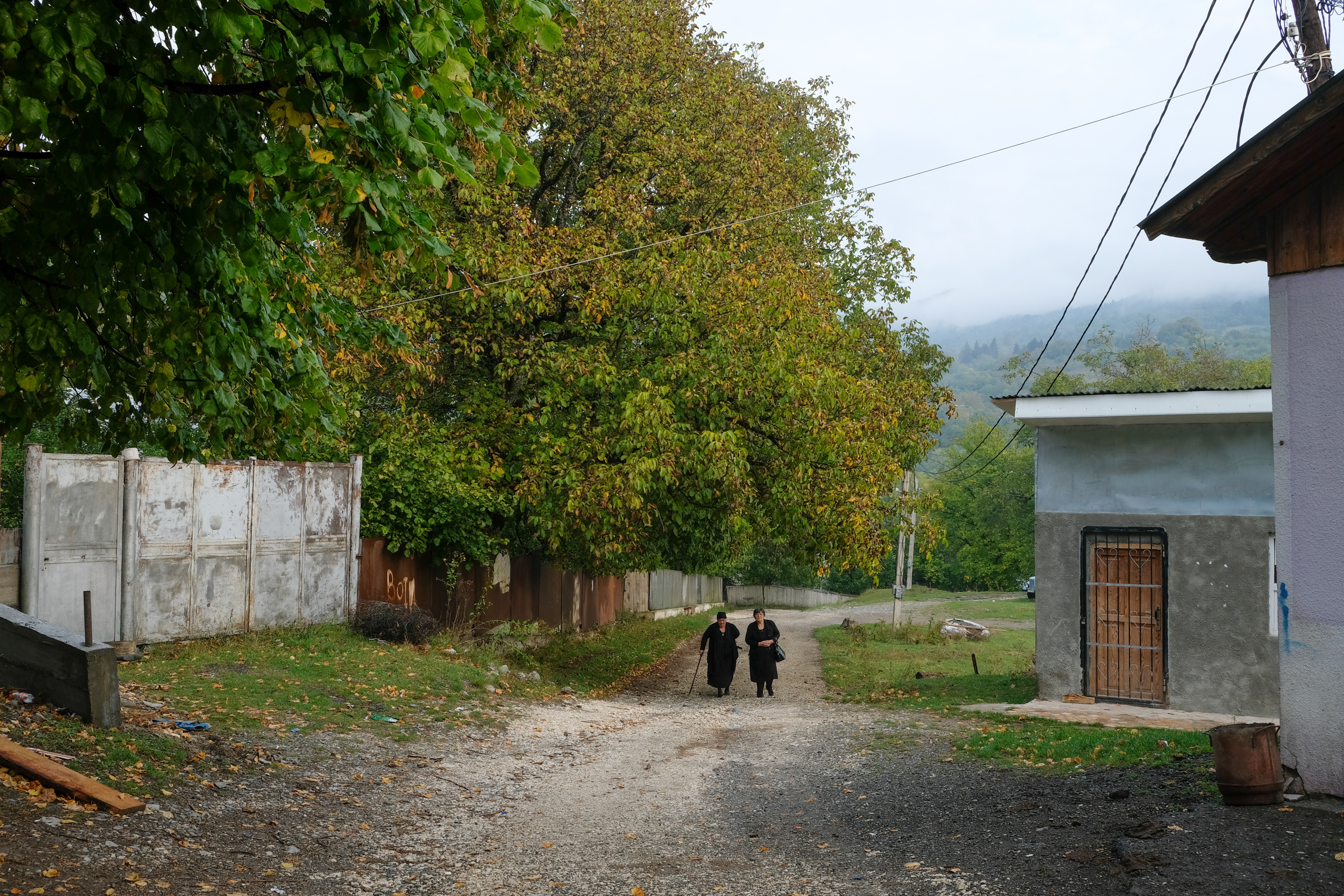
In Nikortsminda, a small village on top of a hill in Georgia’s mountainous Racha region, wine and winemaking have a profound and deeply spiritual meaning, including to the village priest.
“Wine is more important than anything else, more important than the church itself.”
Father Tornike, a tall man in his thirties, smiles with his eyes while speaking. He is seated at the table in his kitchen, with a brown coat reaching all the way down to his feet and a metal cross hanging around his neck.
“Wine is a way of connecting with God. It is where life starts, nothing exists without wine,” he says.
With one hand, he grabs a carafe filled with brightly coloured orange wine and starts pouring up to the brim of each glass.
There are plates with homemade salty cheese and bread baked by his wife on the table, and tomatoes cut in thick slices. Outside the windows are the high mountains of Racha, one of Georgia’s northernmost regions. Besides its massive mountain ranges and wild nature, Racha is known for one thing: its sweet-tasting wine.
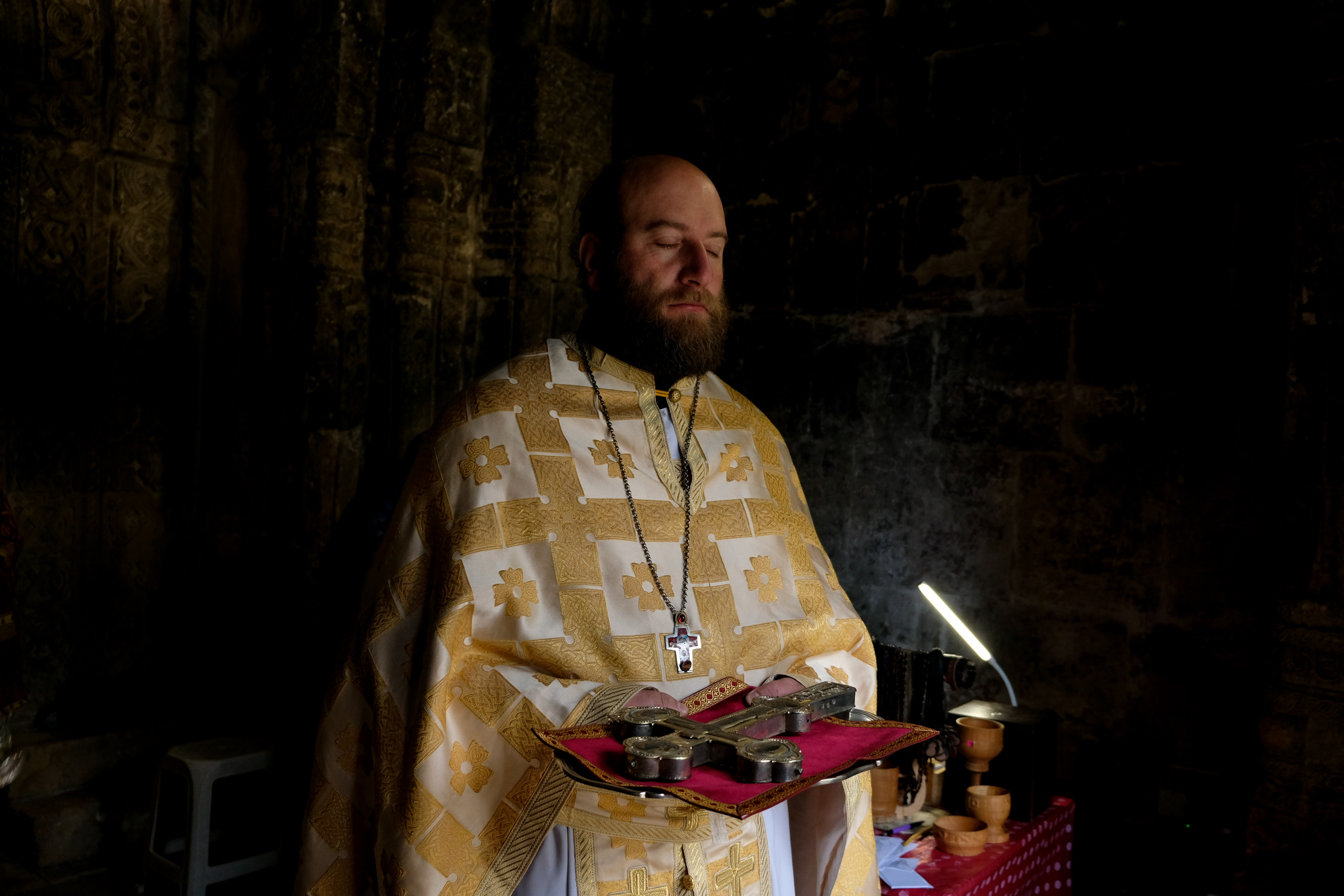
“Wine means love for us, it is how we get to know people. And the history of wine started right here,” Father Tornike says.
Here, to be precise, are the valleys and slopes of the southern Caucasus, today’s Georgia, Azerbaijan and Armenia. This is where viticulture is believed to have first developed, some 8000 years back in history (there has been evidence of early winemaking found in Iran and China as well). Two millennia later, 6000 years ago, people in the Caucasus began to bury vessels filled with grapes below ground, for the fruit to ferment and turn into wine. That method – known as kvevri – is still used by many winemakers in Georgia today.
And wine, winemaking and wine consumption remain an essential part of life in the country.
This is where viticulture is believed to have first developed, some 8000 years back in history.
“Winemaking has always been part of our Georgian identity. It got lost during the USSR years, but we are now reclaiming it through wine production,” says Ilo Menabde, one of Georgia’s new generation of winemakers.
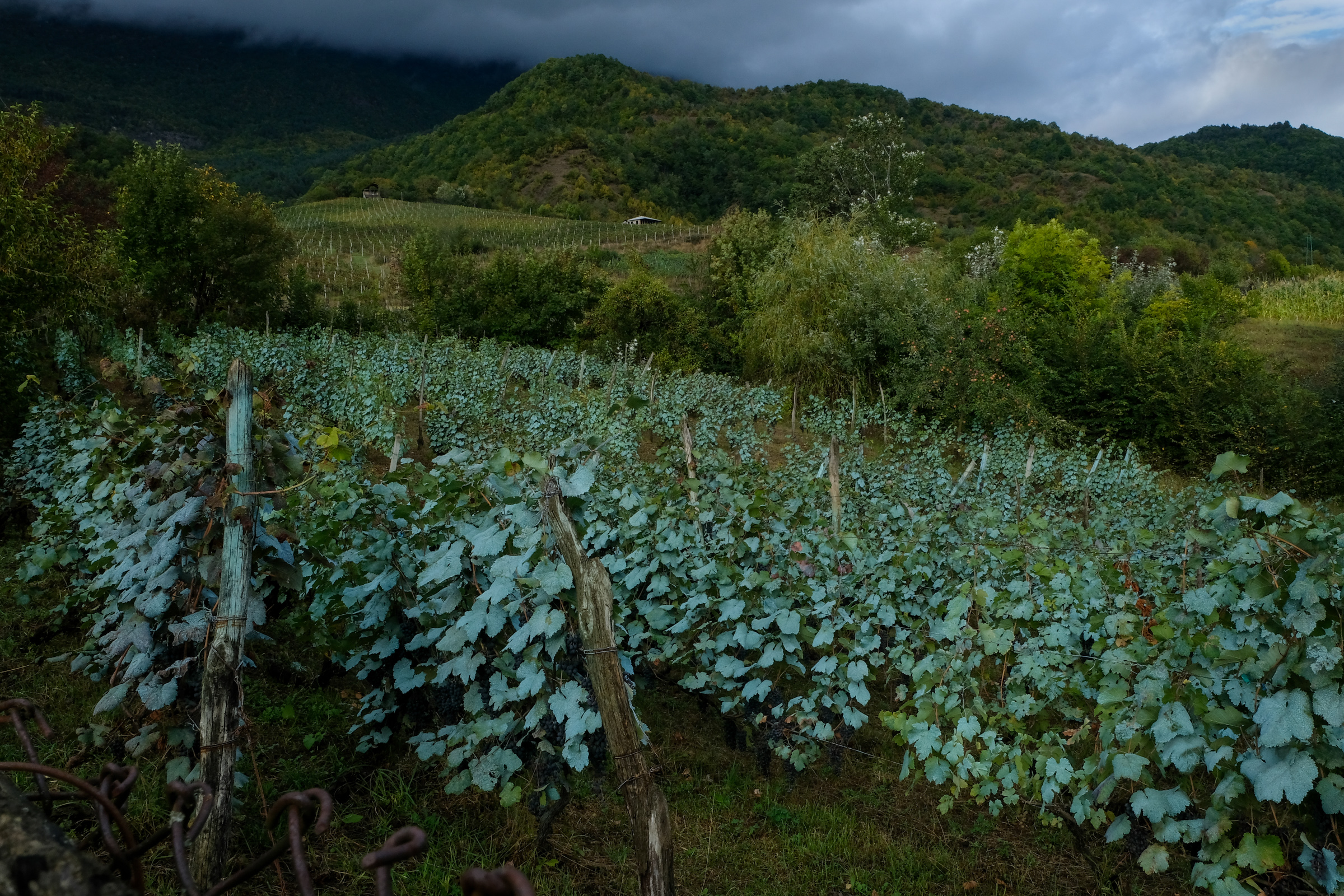
He stands in his vineyard on the slopes surrounding Ambrolauri, the largest town in Racha. This is where grapes like the Alexandrouli are grown, used to make Racha’s popular Khvanchkara wine. At the entrance of the city, a statue in the form of a big bottle serves as a welcome. Popular myth says that Khvanchkara was the favourite wine of Stalin – but that should be taken rather lightly, since most Georgian wines at one point or another have been “associated with the name of Stalin“.
Father Tornike, like many other Georgians, makes his own wine at home each year – and on Sundays, he serves it in church. In fact, all altar wine in Nikortsminda, the small village where he lives with his family, is made either by the father himself or another member of the community.
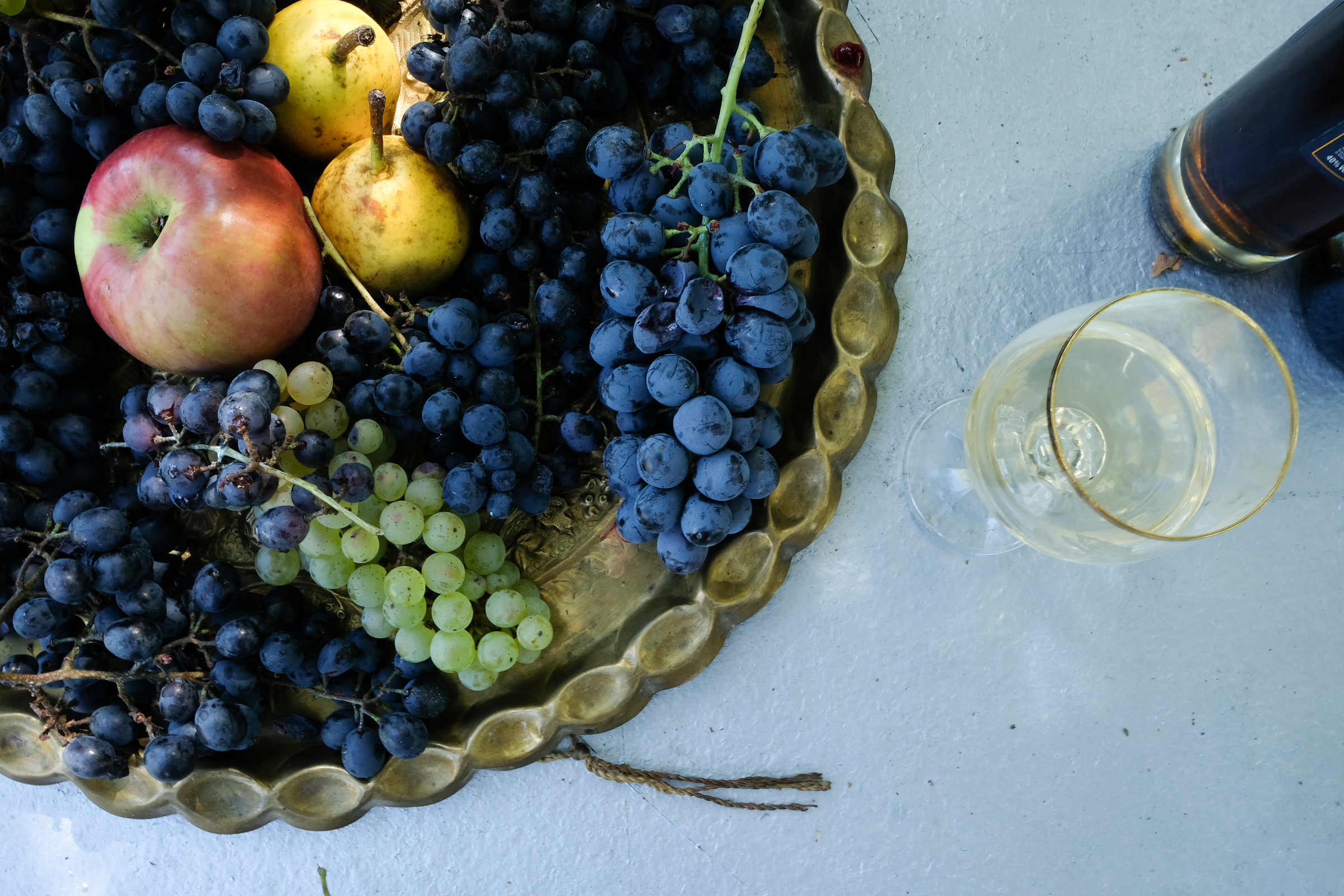
Nikortsminda, home to perhaps 300 families, is only a short drive up the mountains from Ambrolauri, but the descent is enough to make land in the village unfit for growing grapes. Instead, families maintain small plots of land further down in the valley.
“In our grandparents’ time, everyone had their own land. Some still do, but many buy grapes from other growers now,” Rosa Vachadze, one of the inhabitants of the village, says.
She is seated at the back of the garden surrounding Nikortsminda’s church, on a wooden bench in the shade of a tree. Next to her sits Soliko Gegeshidze, one of her friends. Both are regular churchgoers, and experienced makers of their own wine.
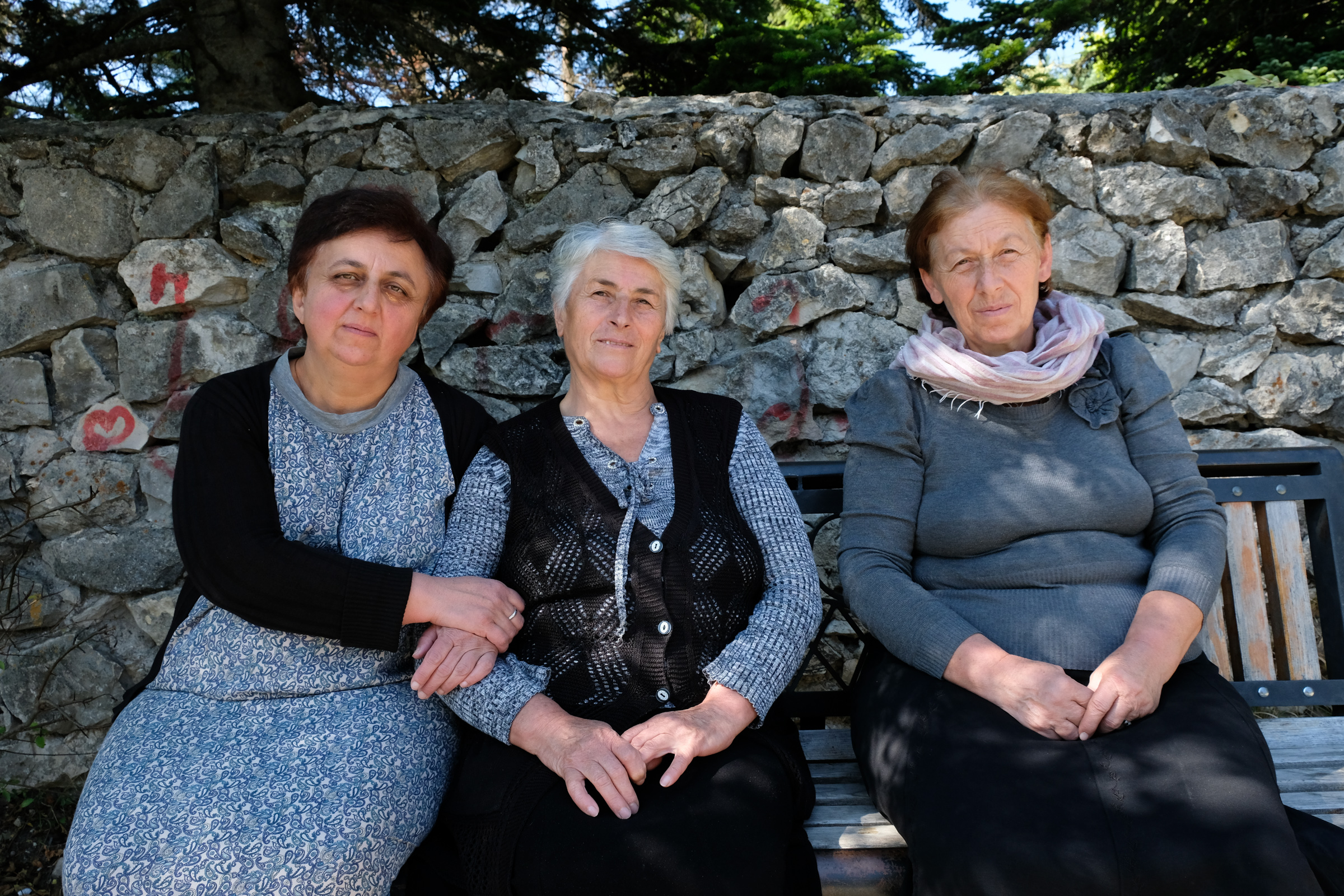
Each year, Vachadze says, her family makes at least 500 litres of wine. Gegeshidze, who lives alone, makes around 200 litres.
“I immediately know when I’m drinking Soliko’s wine. It has a specific aroma and a taste that is different from others,” Vachadze says.
“I immediately know when I’m drinking Soliko’s wine. It has a specific aroma and a taste that is different from others.”
Both women gift wine from their yearly produce to the church, to be served at Communion. Gegeshidze is also the one who bakes all sacramental bread.
“Wine and bread are my offerings to the community. They are both a sacrifice and a gift,” she says.
Father Tornike, who has four children, involves his entire family in the winemaking every year. That is also how he learned himself: as a kid, joining his grandparents in the pressing of grapes.
“You need a big family to make wine, which is good because here, we live three generations together,” he says.
At the back of his house, where a small door leads out to the garden, an entire room is dedicated to making and storing wine. For now, all bottles are empty: the season is yet to begin. On the grass outside is a long wooden tub, called sacnakhel in Georgian, used for pressing the grapes. For fermenting, Father Tornike – just like many other current-day winemakers – uses wooden barrels rather than the traditional kvevri.
“Each person has their own way of making wine. Even if you use the same grapes, it will taste different. How you care for your vineyard is important, but most important of all is a good mood,” he says.
“If a wine doesn’t make your heart happy then it’s not a good wine.”
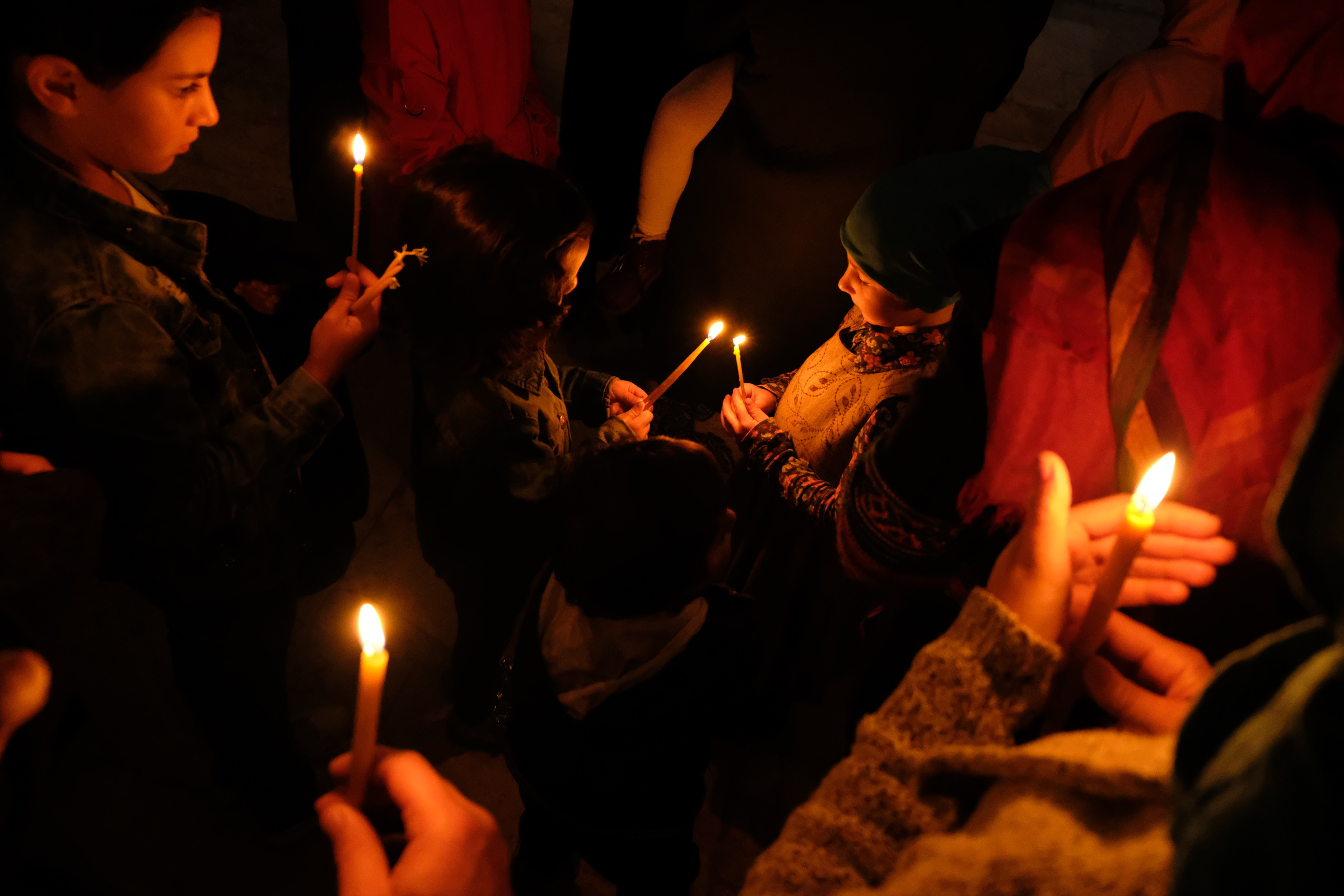
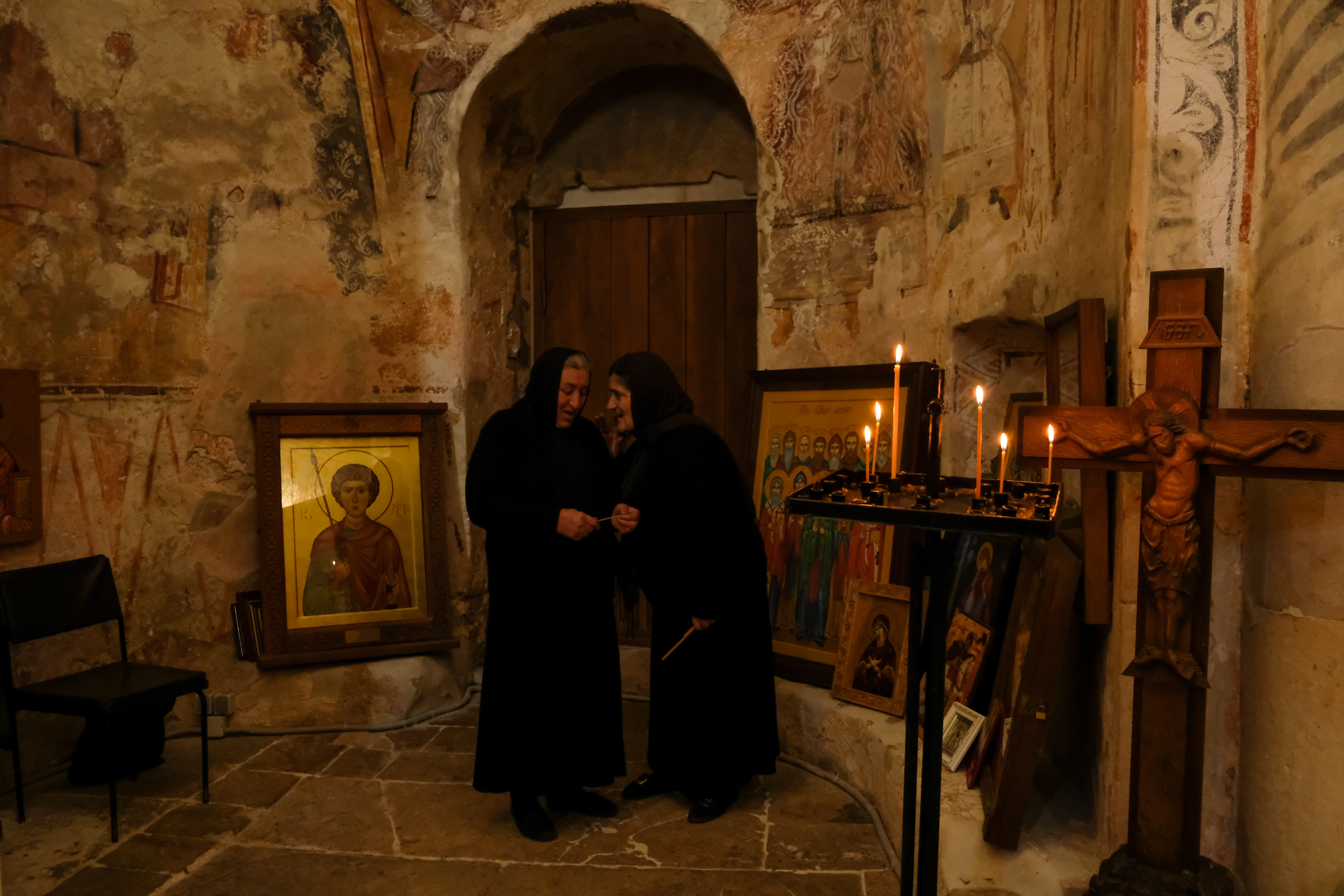
The church in Nikortsminda, set on a small hill surrounded by pines, is only a short walk from Father Tornike’s house. Like many Georgian churches and cathedrals, it has an old history. The structure was built in the 11th century; the icons and frescoes painted centuries later. Most Georgians know it through the poem of 20th century national poet Galaktioni, who described it as “carved with magic lace”.
Like wine, Christianity has a long history in Georgia. Along with neighbouring Armenia, the country has one of the world’s oldest churches: the faith was made state religion in 337AD. Throughout history, it managed to withstand invasions, conquests and periods of foreign rule, including 70 years as a Soviet republic, when the official policy towards religion ranged from oppression to discouragement. Today, a vast majority of Georgians are members of the Orthodox church, which since independence in 1991 has played an increasingly important role in society, not least as a basis for identity.
Along with neighbouring Armenia, Georgia has one of the world’s oldest churches.
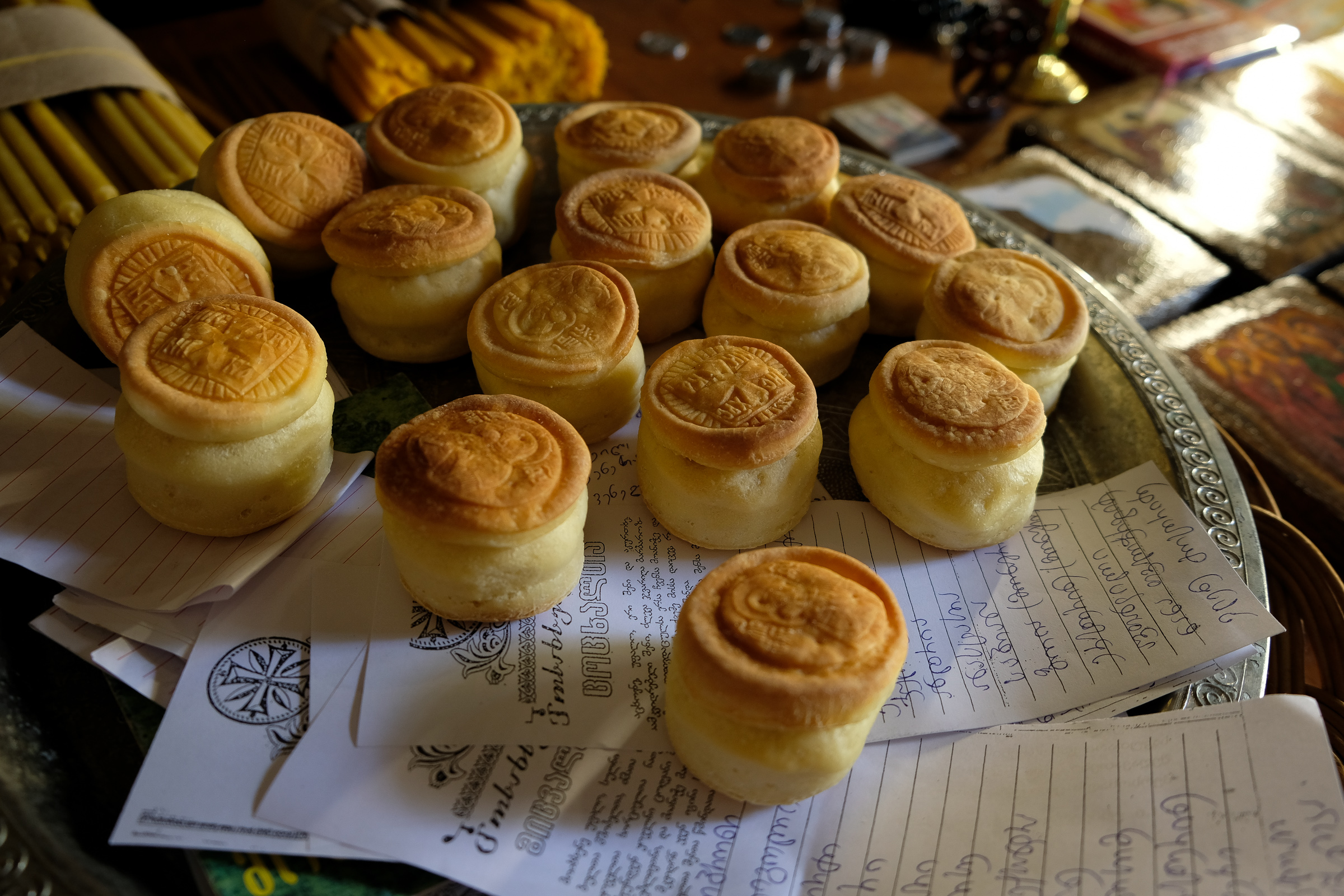
In Nikortsminda, the church starts filling up early on Sunday morning. Father Tornike is among the first to get there, and start preparing for mass. Soon, people from the village arrive on foot from their houses. Ladies come in long coats, children in woollen hats and boots. Mornings are cold in Racha, even during early autumn. Upon entering the church, people pay with coins for long, thin candles, which are lit and placed on metal trays inside the church.
Father Tornike comes out from the sacristy wearing a long cape with embroidered crosses in gold; the deacons wear red and blue, also with golden decorations. There is a small choir of four people – including Gegeshidze – who sing hymns throughout the mass.
“Each person has their own way of making wine. Even if you use the same grapes, it will taste different.”
Towards the end of the ceremony, ceramic vessels are brought out with wine, and plates with bread that have been broken in pieces. One by one, people get served from the offerings of Gegeshidze and Father Tornike.
After mass was celebrated the previous weekend, in a church not far from Nikortsminda, 80 people gathered to share a meal.
“Guess how many bottles of wine we shared among each other? 100!” Father Tornike says.
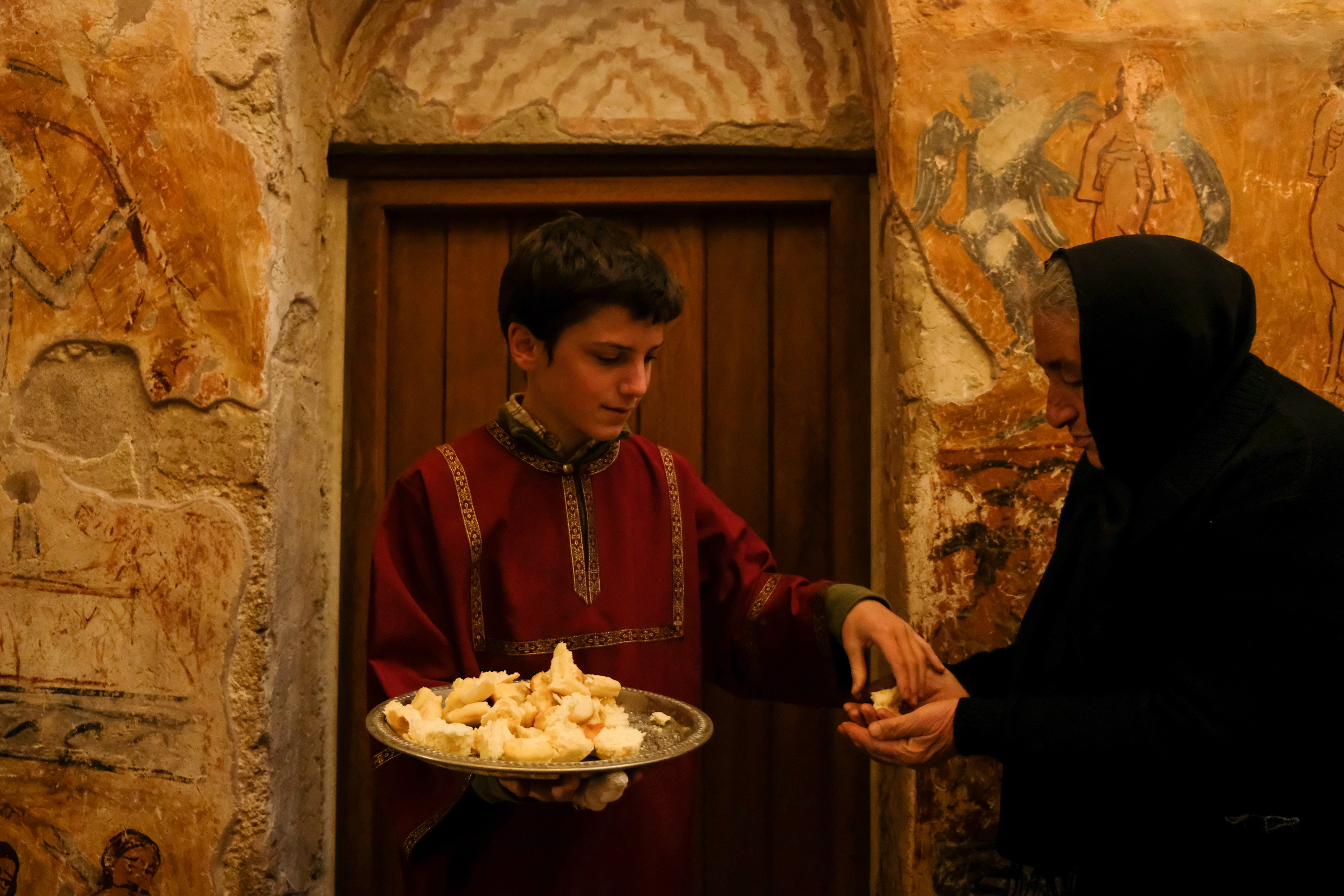
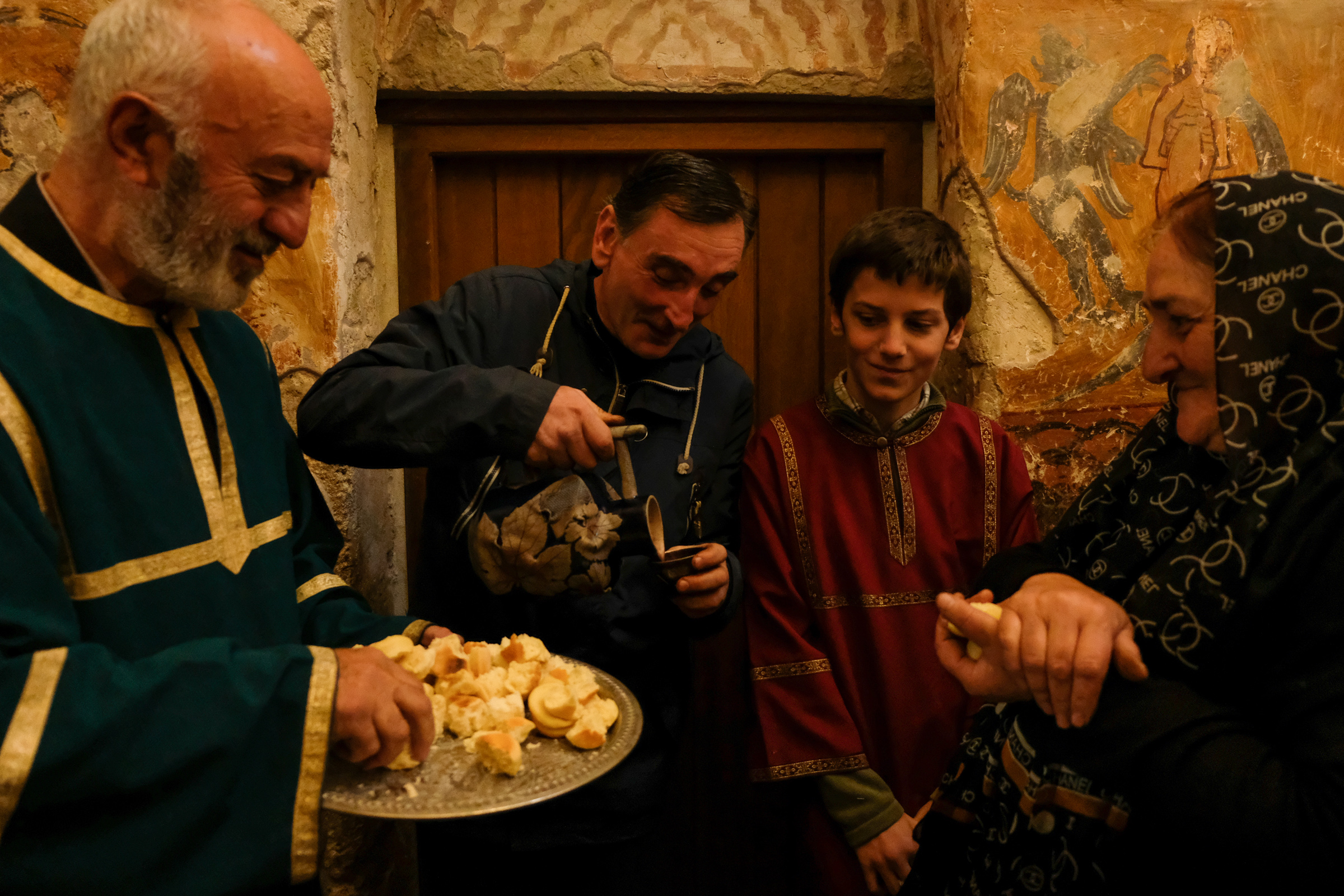
When mass is finished and plates and vessels are empty, Gegeshidze and the others from the choir take company home. The tradition of the four women, ranging in age from thirty-something to seventy, is to spend Sundays after church together.
“We always do. We go to someone’s house to eat and drink until we fall asleep on the sofa!” one of the women says with a laughter.
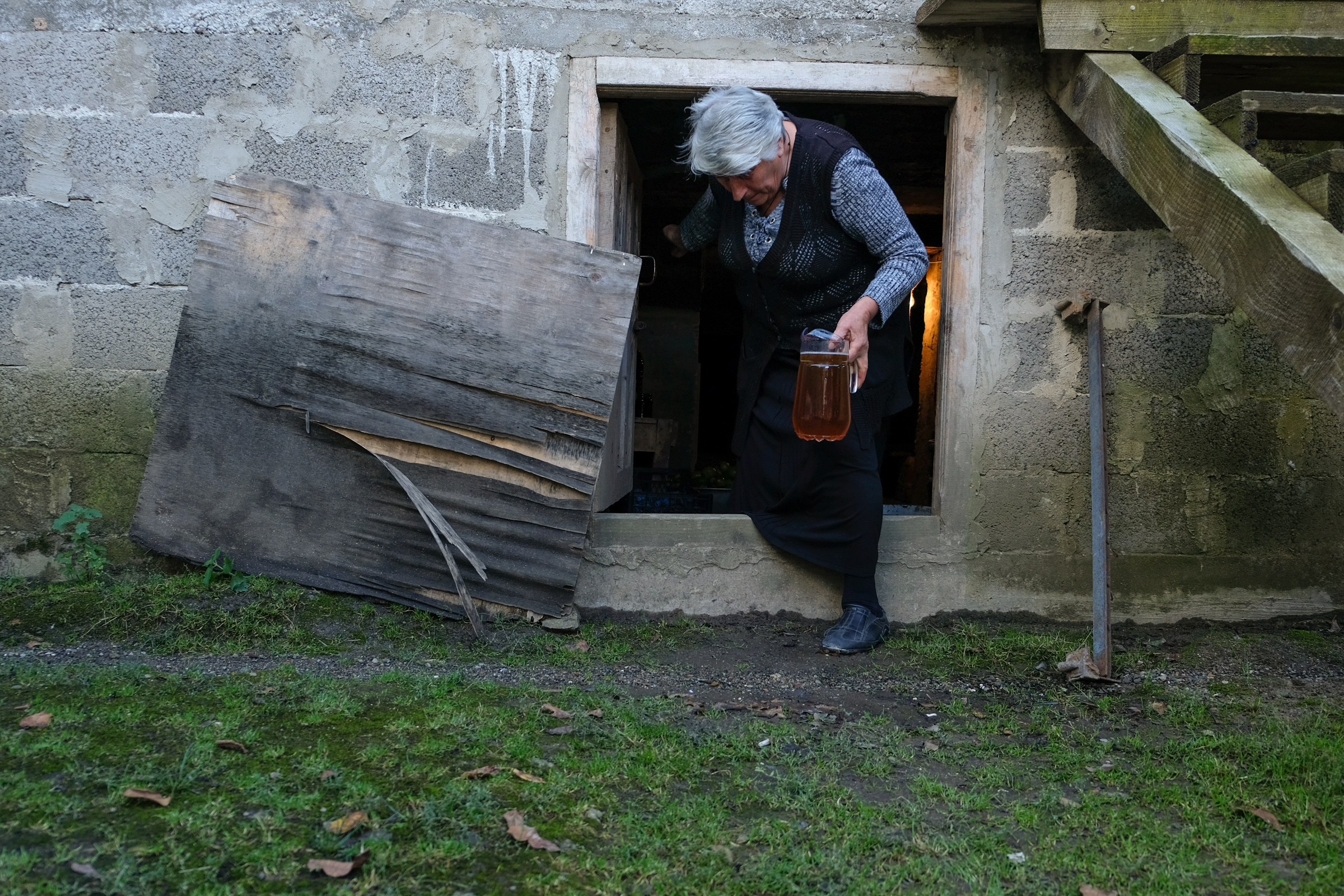
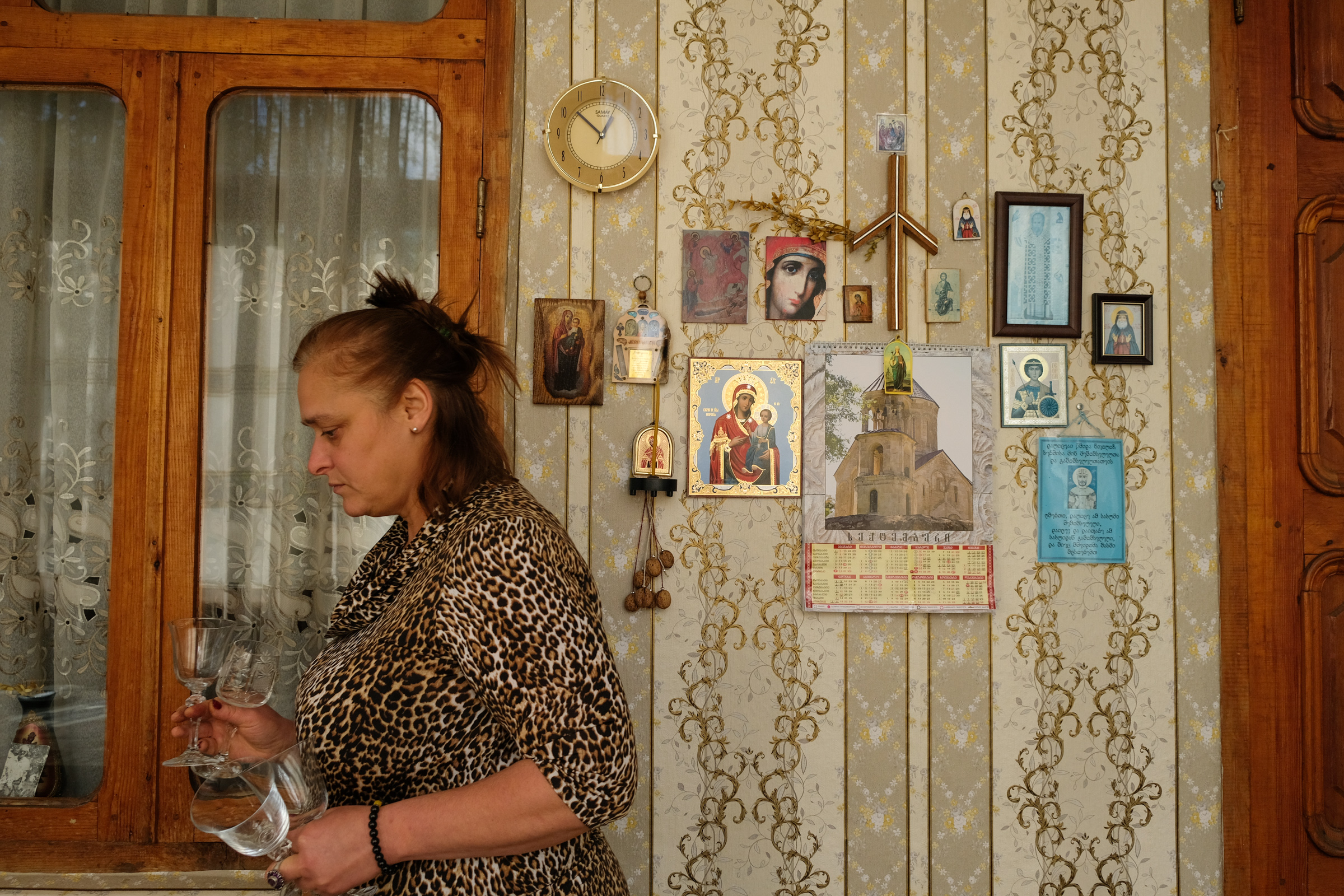
As they arrive at the house, plates with food are immediately brought out. There is fried pork along with cheese and vegetables, chicken in walnut sauce, and stacks of lobiani, Racha’s traditional bean-filled bread. Gegeshidze takes a carafe down to the cellar underneath her house, to bring up the first of many rounds of wine.
The four sit down around the kitchen table. Lace curtains hang in the windows; a wood-fired stove is lit in a corner. As soon as all are seated, the first toast is made.
“This one is for God,” one of the women says and raises her glass.
“This one is for God.”
The lunch – or supra, as festive meals are called in Georgia – continues in the same way. Toast after toast is made: first to the church and the generous host, then to friends and parents and those who are no longer with us. The women start to speak about their fathers, and about Gegeshidze’s husband, who passed away several years ago. His picture, in black and white, has been placed in one of the window frames.
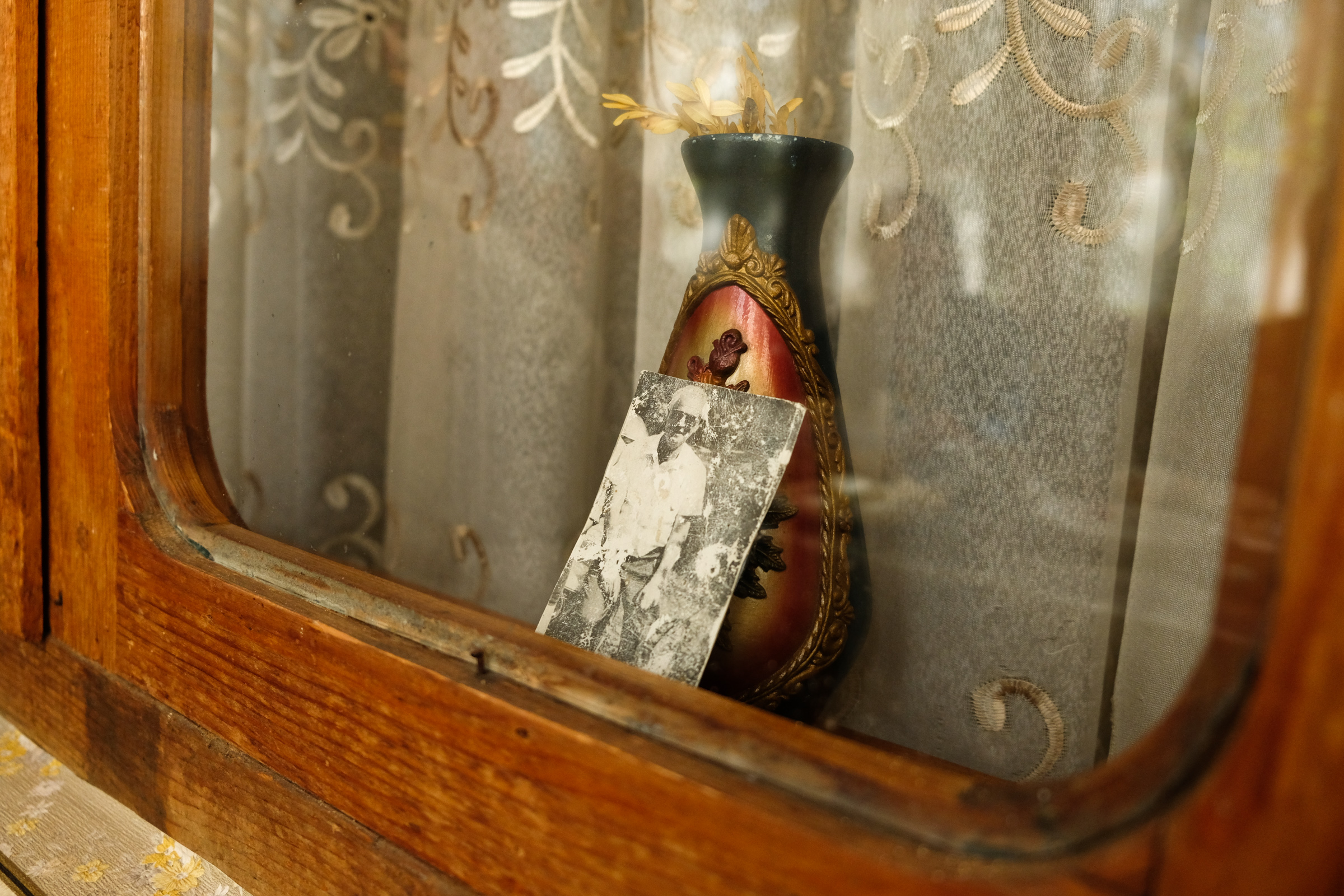
Many songs are sang, both religious hymns and pieces from the Georgian canon. Gegeshidze keeps an eye on the plates, to make sure that none is empty. And, even more carefully, on the glasses, which she constantly refills with wine.
“But it doesn’t matter so much what you serve to eat and drink,” she says.
“The company around the table is the most important.”
